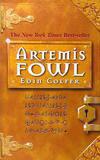
It’s been a while since I first read the Artemis Fowl series and I figure it’s about time to do a reread. I loved the books each previous time I read them. We’ll see how it goes this time around…
Short version? They’re still great.
Let us proceed under the assumption that the fairy folk do exist, and that I am not a gibbering moron. – Artermis Fowl
In the world of Artemis Fowl, faeries (and various other related species, known collectively as The People) are real. They live underground and are a few hundred years at least ahead of humanity technologically. Artemis Fowl is a young boy (~11 years old) who’s entirely too smart for his own good and determined to steal some gold from the People. One thing leads to another, Fowl manages to outsmart everyone, and get gets the gold–along with a bit of positive character development by the end.
Characterwise, Artemis Fowl is what really sells the book. He’s 11 but talks like he’s much older–and devotes himself to a life of crime. He quite often doesn’t feel real, even if he were the smartest 11 year old ever (I had a similar problem with Ender’s Game), but he’s amusing at least. It did annoy me a bit when Colfer dropped some of Fowl’s supposed accomplishments in. I know he’s the smartest ever, but some of the things he is supposed to have done are just flat out not possible.
If I win, I’m a prodigy. If I lose, then I’m crazy. That’s the way history is written.
-- Artermis Fowl
After that, Fowl’s bodyguard/butler Butler (of the family Butler) is a pretty good counter point to Fowl. He’s nowhere nearly as book smart, but he knows his own field (bodyguarding) well and is a lot more down to Earth. Plus he’s a good moral foil for Fowl, up until the point where Fowl’s life is in danger.
Butler could kill you a hundred different ways without the use of his armoury. Though I’m sure one would be quite sufficient.
Then the People: Holly Short, the first female elf cop; Commander Root, her anger management poster child of a boss (who absolutely needs to be played by J.K. Simmons as J. Jonah Jameson if this is ever made into a movie); and the centaur Foaly, who is probably just as smart as Fowl and just as arrogant as well. All interesting and all with unique voices that help sell the story.
Writingwise, you can certainly tell that the target audience of Artemis Fowl is younger. The People love their slime baths. A fight towards the end of the book ends by way of high speed dwarven excrement.
One final thing that I noticed more this time around than previously was how the People are always bashing on humans for fighting all of the time and polluting the world. And yet they have gas powered wings and blatent inter- species racism and fighting. Perhaps it’s meant to highlight that no matter how much better you think you are than someone else, everyone has issues?
Overall, a lovely book. I’m glad I’m rereading them.
Final note: I remember the first time I read these books, using the text on the cover along with the known first few lines of the People’s Book to break the code running along the bottom of the pages. To teenage me, that was pretty much awesome even if what it actually says isn’t hugely important.
Second final note: So, wasn't the entire point of Fowl's final plan that if you forced yourself to go to sleep while in a time stop, you'd be forced back to the real time? So... why didn't Cudgeon get sent out when Root finger darted him? Given that it happened right before Fowl's plan needed to go off, that would have been useful information to have, no?